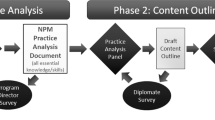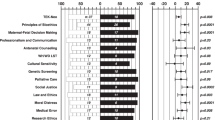Abstract
OBJECTIVE: To evaluate an educational intervention in evidence-based ethics (emphasizing clinical knowledge, epidemiologic skills, and recognition of ethical issues) administered to house staff before rotating through our neonatal intensive care unit.
STUDY DESIGN: A controlled trial of 64 pediatric house staff assigned to alternating control and intervention rotations. Questionnaires were administered at the end of the rotation.
RESULTS: Some benefits of the intervention were observed. However, a large percentage of intervention and control house staff substantially overestimated (>1.25 correct value) predischarge mortality (23% vs. 55% of house staff; p<0.02), mortality or major morbidity (74% vs. 46% of house staff; p=0.04), and cerebral palsy rates (70% vs. 87%; p=0.12). Neither group cited many methodological criteria for evaluating follow-up studies (3.3 vs. 2.4 criteria; p=0.05) or ethical issues considered in treatment recommendations for extremely premature infants (3.1 vs. 2.8 issues; p=0.35).
CONCLUSION: Improved house staff training in evidence-based ethics is needed.
This is a preview of subscription content, access via your institution
Access options
Subscribe to this journal
Receive 12 print issues and online access
$259.00 per year
only $21.58 per issue
Buy this article
- Purchase on Springer Link
- Instant access to full article PDF
Prices may be subject to local taxes which are calculated during checkout
Similar content being viewed by others
References
Nelson LJ, Nelson RM Ethics and the provision of futile, harmful, or burdensome treatment to children Crit Care Med 1992 20 427–433
Lantos J Do we still need doctors? New York: Routledge 1997
Meadow W, Lantos JD, Mokilla M, Reimshisel T Distributive justice across generations. Epidemiology of ICU care for the very young and the very old Clin Perinatol 1996 23 597–608
Avery GB Futility considerations in the neonatal intensive care unit Semin Perinatol 1998 22 216–222
Lachlan F, Arnold R, Frader J Teaching clinical ethics in the residency years: preparing competent professionals J Med Philos 1991 16 93–112
Perkins HS Teaching medical ethics during residency Acad Med 1989 64 262–266
Diekma DS, Shugerman RS An ethics curriculum for the pediatric residency program: confronting barriers to implementation Arch Pediatr Adolesc Med 1997 609–614
Medical Ethics Subcommittee, American Board of Pediatrics Teaching and evaluation of interpersonal skills and ethical decision-making in pediatrics Pediatrics 1987 79 829–833
Tyson JE Evidence-based ethics and the care of premature infants Future Child 1995 5 197–213
Fleischman AR Teaching medical ethics in a pediatric training program Pediatr Ann 1981 10 51–54
Walters JW Approaches to ethical decision-making in the neonatal intensive care unit Arch Dis Child 1988 142 825–830
Sackett D, Rosenberg WMC, Gray JAM, Haynes RB, Richardson WS Evidence-based medicine: what it is and what it isn't BMJ 1996 312 71–72
Haywood JL, Goldenberg J, Bronstein J, Nelson KG, Carlo W Comparison of perceived and actual rates of survival and freedom from handicap in premature in infants Am J Obstet Gynecol 1994 171 432–439
Morse SB, Haywood JL, Goldenberg RL, Bronstein J, Nelson KG, Carlo WA Estimation of neonatal outcome and perinatal therapy use Pediatrics 2000 105 1046–1050
OPRR Reports Code of Federal Regulations. 45 CFR46; 1981
United States Department of Health and Human Services OPRR NIH Protecting Human Research Subjects Institutional Review Board Guidebook US Government Printing Office; Washington, DC; 1993 p. 3–16
Tyson J, Younis N, Verter J, Wright L Viability, morbidity, and resource use among newborns 501–800 g birth weight JAMA 1996 276 1645–1651
Saigal S, Szatmari P, Rosenbaum P, Campbell D, King S Cognitive abilities and school performance of extremely low birth weight children and matched term controls at eight years J Pediatr 1991 118 751–760
Hack M, Taylor G, Klein N, Eiben R, Schatscheneider M, Mercuri-Minich N School age outcomes in children with birthweight under 750 grams N Engl J Med 1994 331 753–759
Robertson CMT, Suave RS, Christianson HE Province-based study of neurologic disability among survivors weighing 500 through 1249 grams at birth Pediatrics 1994 93 636–640
Robertson CMT, Hrynchyshyn GJ, Etches PC, Pain KS Population-based study of the incidence, complexity, and severity of neurologic disability among survivors weighing 500 through 1250 grams at birth: a comparison of two birth cohorts Pediatrics 1992 90 750–755
Mutch LM, Johnson MA, Morley R Follow-up studies: design, organization, and analysis Arch Dis Child 1989 64 1394–1402
Lorenz JM, Woolierver DE, Jetton JR, Paneth N A quantitative review of mortality and developmental disability in extremely premature newborns Arch Pediatr Adolesc Med 1998 425–435
Crausman RS, Armstrong JD Ethically based medical decision-making in the intensive care unit: residency teaching strategies Crit Care Clin 1996 12 71–84
Frader J, Thompson A Ethical issues in the pediatric intensive care unit Pediatr Clin North Am 1994 41 1405–1421
Fleischman AR, Nolan K, Dubler NN, et al Caring for gravely ill children Pediatrics 1994 94 433–439
Ruark JE, Raffin TA, Stanford University Medical Center Committee on Ethics Initiating and withdrawing life support; principles and practice in adult medicine. N Eng J Med 1988 318 25–30
Wenger NS, Liu H, Lieberman JR Teaching medical ethics to orthopedic surgery residents J Bone Jt Surg Am 1998 80 1125–1131
Sulmasy DP, Geller G, Faden R, Levine DM The quality of mercy. Caring for patients with “do not resuscitate” orders JAMA 1992 267 682–686
Sulmasy DP, Song KY, Marx EX, Mitchell JM Strategies to promote the use of advance directives in a residency outpatient practice J Gen Intern Med 1996 11 657–663
Sulmasy DP, Levine DM, Faden RR A randomized trial of ethics education for medical house officers J Med Ethics 1993 19 157–163
Saigal S, Feeny D, Rosenbaum P, Furlong W, Burrows E, Stoskopf B Self-perceived health status and health-related quality of life of extremely low-birth-weight infants at adolescence JAMA 1996 272 453–459
Tyson JE, Broyles RS Progress in assessing the long-term outcome of extremely low-birth weight infants JAMA 1996 276 492–497
Oxman AD, Sackett DL, Guyatt GH for the Evidence-Based Medicine Working Group Users guides to the medical literature. I: How to get started JAMA 1993 270 2093–2095
Evidence-Based Medicine Working Group Evidence-based medicine: a new approach to teaching the practice of medicine JAMA 1992 268 2420–2425
Sackett DL Evidence-Based Medicine: How to Practice and Teach EBM New York: Churchill Livingstone; 1997
Author information
Authors and Affiliations
Additional information
This study was supported by the American Academy of Pediatrics (Resident Research Grant Award) and by the National Institutes of Child Health and Human Development (Specialized Clinical Fellowship 3U10HD21373-12S1).
Rights and permissions
About this article
Cite this article
Major-Kincade, T., Tyson, J. & Kennedy, K. Training Pediatric House Staff in Evidence-Based Ethics: An Exploratory Controlled Trial. J Perinatol 21, 161–166 (2001). https://doi.org/10.1038/sj.jp.7200570
Received:
Accepted:
Published:
Issue Date:
DOI: https://doi.org/10.1038/sj.jp.7200570
This article is cited by
-
Disenchantment and clinical ethics
Medicine, Health Care and Philosophy (2019)
-
A Meta-analytic Comparison of Face-to-Face and Online Delivery in Ethics Instruction: The Case for a Hybrid Approach
Science and Engineering Ethics (2017)
-
The Is-Ought Problem in Practical Ethics
HEC Forum (2017)
-
ELSI practices in genomic research in East Asia: implications for research collaboration and public participation
Genome Medicine (2014)
-
A systematic review of how studies describe educational interventions for evidence-based practice: stage 1 of the development of a reporting guideline
BMC Medical Education (2014)



